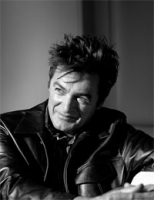
Year Born:
1949
Year of Induction:
2006
Member of CAB Hall of Fame
Lavoie, Daniel (1949- )
Daniel Lavoie was born in the francophone community of Dunrea, in Manitoba. The eldest of six children, including two adopted aboriginal girls, he was raised by a father who worked as a shopkeeper and a stay-at-home mother who was also a musician at heart. Very early on, Daniel learned to play piano. He continued his music education with the Jesuits in St-Boniface, where he went off to study when he was 14 years old.
Strongly influenced by 1960s anglophone rock music, Daniel then realized that he was an artist at heart, but he decided to launch his career in French.
In 1967, he won a singing contest on the Radio-Canada program Jeunesse Oblige, and subsequently appeared on the bar scene along with the groups Spectre and Dieu de l’amour. In 1970, Daniel set off to conquer Quebec with his group of musicians. Singing just as easily in English as in French, he recorded his first 45-rpm records in 1973 and 1974, but success was not immediate. In 1975, he recorded an album entitled À court terme, which was a hit in France, as well as in Portugal and Brazil, thanks to one of the songs that had been recorded in Portuguese.
Daniel Lavoie finally made a breakthrough in Quebec in 1977 with his album Berceuse pour un lion. His success was again confirmed with the album Nirvana bleu, which came out in 1979.
He went on to become one of the first Canadian francophone singers to enjoy success on both sides of the Atlantic. In 1981, he was awarded the Félix as “Best Singer.”
He then launched an album in English entitled Craving that was almost ignored by the market. Meanwhile, his tours were very successful. It was the album Tension attention that really put him on the map as a big star, in 1984. His hit song Il s’aiment sold more than 2 million copies, which made it Daniel Lavoie’s biggest success. In 1984, he received three Félix awards, in 1985, a Midem d’Or in Cannes, as well as the Victoire de la Musique trophy for the best francophone album in France, and in 1986, the Jacques-Blanchet Medal for the quality of his work and the Prix Wallonie-Québec. In 1986, he went to London to record the album Vue sur la mer. That same year, he was invited to appear alongside Liza Minnelli, in New York.
After the album Long courrier in 1990, Daniel Lavoie tried his hand at film, playing in Le fabuleux voyage de l’ange, for which he also wrote the music. He then turned to musical comedy, playing the painter Eugène Delacroix, in Sand et les romantiques, in Paris.
In 1992, he recorded two albums in English, Here in the Heart and Woman to Man. In 1995, he launched Ici and in 1996, Live au Divan Vert, as well as an album for children, Le bébé dragon.
Then, he was chosen to play the role of the Priest Frollo in Notre-Dame de Paris, a creation of Luc Plamondon and Richard Cocciante, which ran for nearly three years, in France and other countries across Europe, as well as in the Province of Quebec.
Daniel Lavoie returned to recording music in 1999 with the album Où la route mène, and then took time off to compose songs for other artists.
He then took on the role of the aviator Antoine de St-Exupéry in the musical adaptation of the book Le petit prince, from October 2002 to April 2003, at the Casino de Paris.
Comédies humaines, an album that was very well received by the critics, was launched in January 2004.
Daniel is also the spokesperson for the Fédération canadienne pour l’alphabétisation en français (FCAF) and the Juvenile Diabetes Research Foundation.
He is married to Louise Dubuc who is his publisher and has often co-written Daniel’s songs. They have three children: Mathieu, Gabrielle and Joseph.
Daniel Lavoie was inducted into the CAB Hall of Fame in the Music Star category in 2006.
Written by Yvon Chouinard – November, 2006
